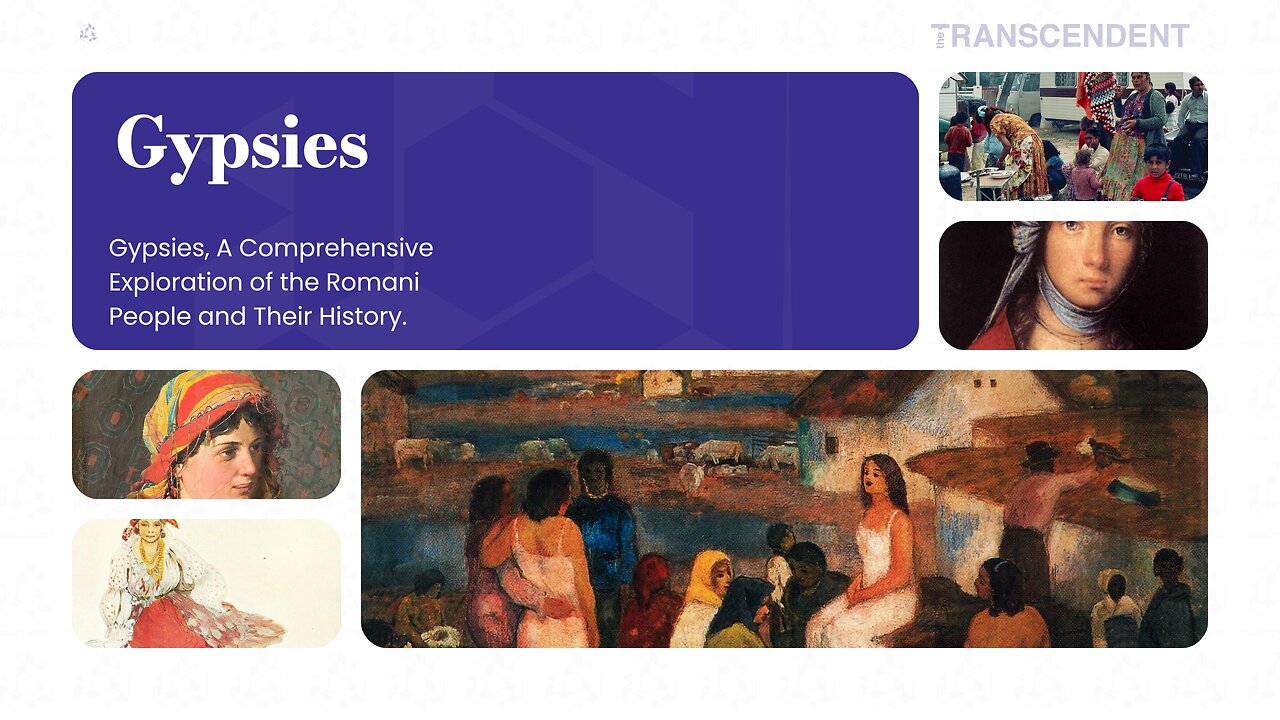Premium Only Content

Gypsies, A Comprehensive Exploration of the Romani People and Their History.
Introduction
The Romani people, often referred to as Gypsies, are a traditionally itinerant ethnic group with a rich and complex history. Originating from northern India, the Romani have spread across the globe, developing unique cultures and languages while facing significant challenges and prejudices. This article delves into their origins, history, famous connections, current challenges, and potential solutions, offering a detailed and factual perspective on the Romani people.
Origin and Historical Background.
Origins in India, Evidence of Indian Roots: Linguistic and genetic studies suggest that the Romani people originated from the Indian subcontinent, particularly from the regions of Rajasthan and Punjab, around 1,000 years ago. The Romani language shares many similarities with Hindi and Punjabi.
Migration:
Historical records indicate that the Romans left India around the 11th century, moving westward through Persia (modern-day Iran) and into Europe by the 14th century. Early European History.
Arrival in Europe:
The Romans were first documented in Europe in the 14th century. They were often mistaken for Egyptians, which led to the term "Gypsy." Their arrival in Europe was met with curiosity and suspicion.
Persecution:
Throughout history, the Romans have faced discrimination and persecution. In medieval Europe, they were often subjected to enslavement, forced assimilation, and violence. The Paramos, or Romani Holocaust during World War II, saw the genocide of hundreds of thousands of Romani people by the Nazi regime.
Cultural Contributions and Famous Connections,
Music and Dance: The Romani have significantly influenced European music and dance, particularly in Spain with Flamenco and in Eastern Europe with styles like Balkan music and Hungarian folk music.
Art and Literature:
Romani culture has inspired numerous works of art and literature. Writers like George Borrow and musicians like Django Reinhardt have brought Romani culture to a broader audience.
Discrimination and Prejudice:
The Romans continue to face widespread discrimination and social exclusion in many parts of Europe. This includes limited access to education, healthcare, and employment.
Poverty:
High levels of poverty and poor living conditions are prevalent in many Romani communities. Lack of Political Representation: The Romans often lack representation in political and social institutions, limiting their ability to advocate for their rights and needs.
Solutions.
Education: Improving access to quality education for Romani children can help break the cycle of poverty and exclusion. Initiatives like scholarships, mentorship programs, and inclusive curricula are crucial.
Anti-Discrimination Laws:
Enforcing and strengthening anti-discrimination laws can help protect the Romani from prejudice and violence.
Economic Opportunities:
Creating job opportunities and supporting Romani entrepreneurs can improve economic conditions within Romani communities.
Political Representation: Encouraging and supporting Romani participation in political processes can ensure that their voices are heard and their needs addressed.
Conclusion.
The Romani people, with their rich history and cultural contributions, continue to face significant challenges in the modern world. By addressing these challenges through education, anti-discrimination laws, economic opportunities, and political representation, we can work towards a more inclusive and equitable society for all.
Books:
https://amzn.to/3WlGQXv
#RomaniHistory #GypsyCulture #CulturalHeritage #AntiDiscrimination #PoliticalRepresentation #Giipsy
-
 LIVE
LIVE
The Quartering
15 hours agoTim Pool SELLS TO DAILY WIRE? Never Eat Hot Dogs Again, Drones & More
3,257 watching -
 LIVE
LIVE
Tucker Carlson
1 hour agoTom Homan’s Plan to Destroy the Cartel Empire, End Child Trafficking, and Secure the Border for Good
9,637 watching -
 1:06:28
1:06:28
Russell Brand
3 hours agoWho Ordered the Hit on Russia’s General Krylov? - SF516
35.1K38 -
 LIVE
LIVE
The Charlie Kirk Show
1 hour agoThe CR Quagmire + An Hour of PBD + Catholic in Hollywood | Davis, Patrick Bet David, Rep. Burlison
7,853 watching -
 32:54
32:54
Kicking Mustang
6 hours agoWatch the Best Ghillie Sniper Moments of 2024...
58 -
 49:34
49:34
PMG
13 hours ago"Hannah Faulkner and Ron Berutti | NEW SUPREME COURT CASES"
472 -
 LIVE
LIVE
The Boomer Effect
14 hours agoPondering Life in Modern America
40 watching -
 1:01:44
1:01:44
Grant Stinchfield
1 hour agoDon't Focus on the Drones... Focus on the Mysterious Floating Orbs!
5171 -
 LIVE
LIVE
The Dana Show with Dana Loesch
1 hour agoSPENDING BATTLE COUNTDOWN | The Dana Show LIVE On Rumble!
547 watching -
 59:38
59:38
The Dan Bongino Show
4 hours agoThings Have Changed, It's Trump's GOP Now (Ep. 2390) - 12/18/2024
559K1K